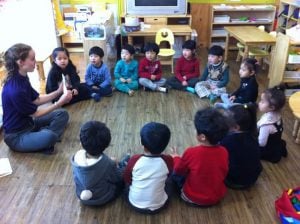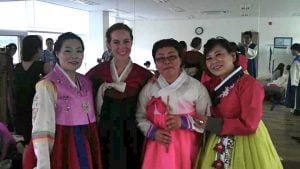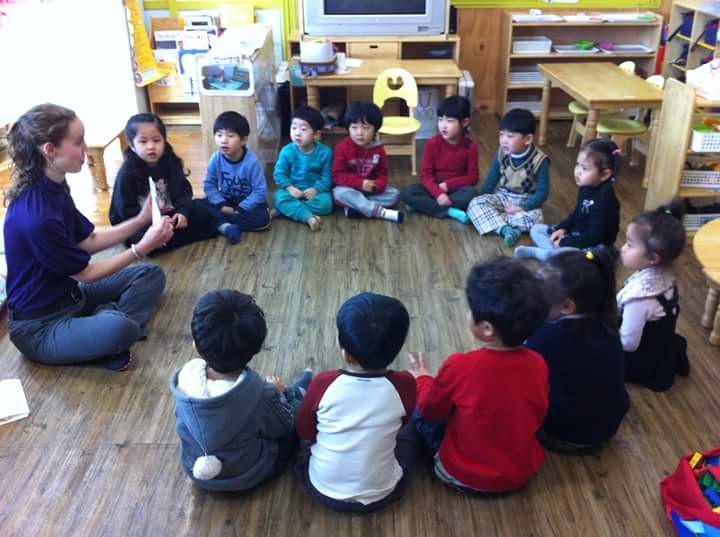
Teaching numbers: Christina Galardi, 2012-2013, Fulbright English Teaching Assistant to South Korea, teaches a captive audience a counting lesson in English as part of an early childhood cognitive development program through iFuture at the University of Ulsan. Ulsan, South Korea
I’m staring at an IQ test with fear that my hard-earned college GPA will be put to shame.
During my winter break from my Fulbright English Teaching Assistant position, I worked for a month with a Korean professor who previously pursued a Fulbright grant in the United States with a venture company that develops child cognitive development programs. I started by taking the same diagnostic test used to assess children.
Thankfully, my test anxiety was resolved by a satisfactory score. The professor then handed me some research articles to familiarize myself with the Feuerstein Instrumental Enrichment Program used by the company. As I sat down with the texts, I blew the dust from my academic machinery and flexed my intellectual muscles.
In a few months, I will lift the scholastic heavyweights again to pursue a master’s degree in public health following my return home to the United States. Perhaps it will take a little while to get back into my routine, but I don’t think my mental force will have atrophied.
When I chose to apply for a Fulbright grant before graduate school, some friends and colleagues expressed concern that I would lose academic momentum. How will the grant build off your background in communications, or further your career goals in public health by teaching English in South Korea?
I felt a sense of purpose in going to South Korea – a feeling that the Fulbright experience would train me outside of the classroom. But I couldn’t immediately define what I stood to gain.
Funny that I had to return to the academic world, as I perused those research papers, to give this power and what I stood to gain from my Fulbright experiences an actual name.
Loosely paraphrasing Feuerstein’s definition, it is the ability to adapt to new circumstances, creatively solve problems in order to survive, and possess openness to new information and experiences. That’s why, in order to gain this power, his cognitive development program had students completing challenges that didn’t drill concepts, but instead, trained them to think.
This is the power of intelligence.

Piri performance: Christina Galardi, 2012-2013, Fulbright English Teaching Assistgant to South Korea, and members of her community music class don the historical Korean hanbok for a performance on the piri, a traditional Korean instrument.
In South Korea, thrown into a new environment and compelled to think on my feet, I am developing this strength.
My undergraduate studies trained me to speak and write clearly and concisely, and countless essays, presentations and debates taught me to analyze situations and defend my opinions. But teaching English has made me more capable of keeping communication simple, and responding to questions about American politics has helped me master the ability to explain my worldviews and reflect on cultural norms.
I see constant overlap between my journalistic experience, my teaching role and my future in public health; I can feel the sinews forming in my neural network. A classroom game is no fun if the instructions are too confusing to understand, just as news readers will toss aside a brilliant piece if the style and ideas are inaccessible for mental play. English grammar and vocabulary lessons must engage students so that knowledge can be quickly recalled in the future; public health messages must be framed to convey their significance, even if the consequences and benefits seem distant.
Perhaps I’m not slaving over textbooks and cranking out research papers during my Fulbright grant. Perhaps teaching middle schoolers how to ask for permission is inapplicable to public health. Perhaps I haven’t learned more about physics or politics or a subject that we associate as being the most erudite. But, I am developing intelligence, now that I know to define it as more than the pursuit of knowledge through classroom education. It’s not about volume of information – it’s about the athleticism of the mind.
Key takeaways for future Fulbright applicants:
Fulbright offers an opportunity to explore new professional and personal directions. Seize the chance to go off the beaten path. It’s perfectly fine for you to propose a project that is new for you as long as you have the requisite academic and professional chops to pull it off; just let your passion for blazing this new trail shine through in your personal statement and statement of grant purpose.
Reflect on how the Fulbright Program can add to your previous classroom experiences through real-world application. Consider ways you can engage with your host community to serve and learn. Describing your commitment to an immersive experience will demonstrate your desire to make the most of the opportunity.


No Comments